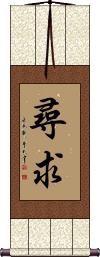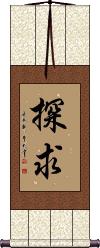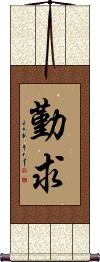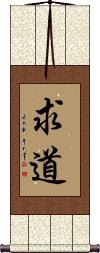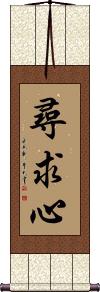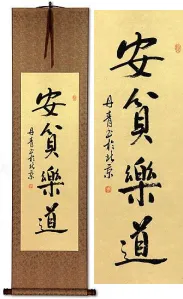Many custom options...
And formats...

Seek in Chinese / Japanese...
Buy a Seek calligraphy wall scroll here!
Personalize your custom “Seek” project by clicking the button next to your favorite “Seek” title below...
Seek
尋求 means to seek or to look for something. Occasionally used in a Buddhist context for seeking something (enlightenment, knowledge, truth, meaning, etc.).
尋求 is rarely used in Japanese and almost exclusively in a Buddhist context (most Japanese will not recognize it as a Japanese word).
Seek / Quest
探求 means: to seek; to pursue; to investigate; quest; pursuit.
探求 has the same meaning in Chinese, Japanese Kanji, and old Korean Hanja.
Buddha Seeking
Seeking Truth
求道 means seeking for truth, or to seek (practice for, strive for) enlightenment.
求道 is used mostly in a Buddhist context, so some non-Buddhists may not recognize it.
Seeking Mind
Seeking Wisdom
智を磨く is an old obscure Japanese phrase that means to refine, cultivate, or improve one's wisdom.
This is the mantra of one who is a seeker of wisdom. They will always want to polish, shine, refine, improve, and expand their knowledge and understanding.
Note: Because this selection contains some special Japanese Hiragana characters, it should be written by a Japanese calligrapher.
This in-stock artwork might be what you are looking for, and ships right away...
Gallery Price: $100.00
Your Price: $49.88
These search terms might be related to Seek:
Do Not Take Action Until the Time is Right
Drain the Pond to Get All the Fish
Fall Down Seven Times, Get Up Eight
Relax / Take It Easy
Take Refuge in the Three Treasures
Take Up a Challenge
Not the results for Seek that you were looking for?
Below are some entries from our dictionary that may match your Seek search...
| Characters If shown, 2nd row is Simp. Chinese |
Pronunciation Romanization |
Simple Dictionary Definition |
干 see styles |
gān gan1 kan motomu もとむ |
(bound form) to have to do with; to concern oneself with; one of the ten heavenly stems 天干[tian1 gan1]; (archaic) shield (irregular okurigana usage) (n,n-pref) drying; dried; (male given name) Motomu A shield; a stem, or pole; to offend; to concern; to seek. |
牛 see styles |
niú niu2 niu ushi(p); gyuu; ushi / ushi(p); gyu; ushi うし(P); ぎゅう; ウシ |
More info & calligraphy: Ox / Bull / Cow(1) cattle (Bos taurus); cow; bull; ox; calf; (2) {food} (usu. ぎゅう) (See 牛肉) beef; (3) (ぎゅう only) {astron} (See 二十八宿,玄武・げんぶ・2) Chinese "Ox" constellation (one of the 28 mansions); (surname) Nyū go, gaus; ox, bull, bullock, etc. A term applied to the Buddha Gautama as in 牛王 king of bulls, possibly because of the derivation of his name; the phrase 騎牛來牛 (or 騎牛覔牛) to ride an ox, to seek an ox, means to use the Buddha to find the Buddha. |
鬼 see styles |
guǐ gui3 kuei oni(p); ki おに(P); き |
More info & calligraphy: Ghost Demon(1) ogre; demon; oni; (2) (See 亡魂) spirit of a deceased person; (3) (おに only) ogre-like person (i.e. fierce, relentless, merciless, etc.); (4) (おに only) (See 鬼ごっこ・おにごっこ) it (in a game of tag, hide-and-seek, etc.); (5) (き only) {astron} (See 二十八宿,朱雀・すざく・2) Chinese "ghost" constellation (one of the 28 mansions); (prefix) (6) (おに only) (slang) (See 超・1) very; extremely; super-; (surname) Miniwa preta 薜荔多, departed, dead; a disembodied spirit, dead person, ghost; a demon, evil being; especially a 餓鬼 hungry ghost. They are of many kinds. The Fan-i ming i classifies them as poor, medium, and rich; each again thrice subdivided: (1) (a) with mouths like burning torches; (b) throats no bigger than needles; (c) vile breath, disgusting to themselves; (2) (a) needle-haired, self-piercing; (b) hair sharp and stinking; (c) having great wens on whose pus they must feed. (3) (a) living on the remains of sacrifices; (b) on leavings in general; (c) powerful ones, yakṣas, rākṣasas, piśācas, etc. All belong to the realm of Yama, whence they are sent everywhere, consequently are ubiquitous in every house, lane, market, mound, stream, tree, etc. |
勤求 see styles |
qín qiú qin2 qiu2 ch`in ch`iu chin chiu gongu ごんぐ |
More info & calligraphy: Buddha SeekingTo seek diligently (after the good). |
參禪 参禅 see styles |
cān chán can1 chan2 ts`an ch`an tsan chan noshi wo ri |
More info & calligraphy: Zen UnderstandingTo inquire, discuss, seek religious instruction. |
尋求 寻求 see styles |
xún qiú xun2 qiu2 hsün ch`iu hsün chiu jingu |
More info & calligraphy: Seekto seek |
探求 see styles |
tàn qiú tan4 qiu2 t`an ch`iu tan chiu tankyuu / tankyu たんきゅう |
More info & calligraphy: Seek / Quest(noun, transitive verb) search; quest; pursuit |
求道 see styles |
qiú dào qiu2 dao4 ch`iu tao chiu tao kyuudou; gudou / kyudo; gudo きゅうどう; ぐどう |
More info & calligraphy: Seeking Truthto seek (practice for, strive for) enlightenment |
菩薩 菩萨 see styles |
pú sà pu2 sa4 p`u sa pu sa mizoro みぞろ |
More info & calligraphy: Bodhisattva(n,n-suf) (1) {Buddh} bodhisattva; one who has reached enlightenment but vows to save all beings before becoming a buddha; (n,n-suf) (2) High Monk (title bestowed by the imperial court); (n,n-suf) (3) (See 本地垂迹説) title bestowed to Shinto kami in manifestation theory; (surname) Mizoro bodhisattva, cf. 菩提薩埵. While the idea is not foreign to Hīnayāna, its extension of meaning is one of the chief marks of Mahāyāna. 'The Bodhisattva is indeed the characteristic feature of the Mahāyāna.' Keith. According to Mahāyāna the Hinayanists, i.e. the śrāvaka and pratyekabuddha, seek their own salvation, while the bodhisattva's aim is the salvation of others and of all. The earlier intp. of bodhisattva was 大道心衆生 all beings with mind for the truth; later it became 大覺有情 conscious beings of or for the great intelligence, or enlightenment. It is also intp. in terms of leadership, heroism, etc. In general it is a Mahayanist seeking Buddhahood, but seeking it altruistically; whether monk or layman, he seeks enlightenment to enlighten others, and he will sacrifice himself to save others; he is devoid of egoism and devoted to helping others. All conscious beings having the Buddha-nature are natural bodhisattvas, but require to undergo development. The mahāsattva is sufficiently advanced to become a Buddha and enter nirvāṇa, but according to his vow he remains in the realm of incarnation to save all conscious beings. A monk should enter on the arduous course of discipline which leads to Bodhisattvahood and Buddhahood. |
倞 see styles |
liàng liang4 liang |
distant; to seek; old variant of 亮[liang4]; bright |
圖 图 see styles |
tú tu2 t`u tu zu ず |
diagram; picture; drawing; chart; map; CL:張|张[zhang1]; to plan; to scheme; to attempt; to pursue; to seek (surname) Zu A plan, map; seal; to plan, scheme, calculate. |
尋 寻 see styles |
xún xun2 hsün hiroshi ひろし |
to search; to look for; to seek fathom; (male given name) Hiroshi To seek; investigate; to continue; usually; a fathom, 8 Chinese feet. |
懺 忏 see styles |
chàn chan4 ch`an chan sen |
(bound form) to feel remorse; (bound form) scripture read to atone for sb's sins (from Sanskrit "ksama") kṣamayati, "to ask pardon"; to seek forgiveness, patience or indulgence, kṣamā meaning patience, forbearance, tr. as 悔過 repentance, or regret or error; also as confession. It especially refers to the regular confessional service for monks and for nuns. |
找 see styles |
zhǎo zhao3 chao |
to try to find; to look for; to call on sb; to find; to seek; to return; to give change |
投 see styles |
tóu tou2 t`ou tou tou / to とう |
to throw (something in a specific direction: ball, javelin, grenade etc); to cast (a ballot); to cast (a glance, a shadow etc); to put in (money for investment, a coin to operate a slot machine); to send (a letter, a manuscript etc); to throw oneself into (a river, a well etc to commit suicide); to go to; to seek refuge; to place oneself into the hands of; (coll.) to rinse (clothes) in water (1) {baseb} pitching ability; (counter) (2) {sports} counter for throws (of a javelin, bowling ball, etc.); (counter) (3) {fish} counter for casts (of a line) To cast, throw into, surrender, tender. |
求 see styles |
qiú qiu2 ch`iu chiu motome もとめ |
to seek; to look for; to request; to demand; to beseech (surname, female given name) Motome To seek, beseech, pray.; v. Seven Strokes. |
牟 see styles |
móu mou2 mou mu む |
barley; to moo; to seek or obtain; old variant of 侔[mou2]; old variant of 眸[mou2] (surname) Mu To low (as an ox); overpass; barley; a grain vessel; weevil; eye-pupil; translit. mu, ma. |
覓 觅 see styles |
mì mi4 mi motomu もとむ |
(literary) to seek; to find (given name) Motomu to search for |
訪 访 see styles |
fǎng fang3 fang hou / ho ほう |
(bound form) to seek by inquiry; (bound form) to visit; to call on (surname) Hou to question |
謀 谋 see styles |
móu mou2 mou matsuda まつだ |
to plan; to seek; scheme plan; strategy; (personal name) Matsuda to plan |
邀 see styles |
yāo yao1 yao |
to invite; to request; to intercept; to solicit; to seek |
三密 see styles |
sān mì san1 mi4 san mi sanmitsu さんみつ |
{Buddh} three mysteries (Buddha's body, speech and mind) The three mystic things: the body, mouth (i.e. voice), and mind of the Tathāgata, which are universal, all things being this mystic body, all sound this mystic voice, and all thought this mystic mind. All creatures in body, voice, and mind are only individualized parts of the Tathāgata, but illusion hides their Tathāgata nature from them. The esoterics seek to realize their Tathāgata nature by physical signs and postures, by voicing of 眞言 dhāraṇī and by meditations, so that 入我我入 He may enter me and I Him, which is the perfection of siddhi 悉地; v. 大日經疏 1. 菩提心論. |
上交 see styles |
shàng jiāo shang4 jiao1 shang chiao |
to hand over to; to give to higher authority; to seek connections in high places |
上訪 上访 see styles |
shàng fǎng shang4 fang3 shang fang |
to seek an audience with higher-ups (esp. government officials) to petition for something |
下化 see styles |
xià huà xia4 hua4 hsia hua geke |
(下化衆生) Below, to transform all beings, one of the great vows of a bodhisattva. 上求菩提 above, to seek bodhi. Also 下濟衆生. |
不圖 不图 see styles |
bù tú bu4 tu2 pu t`u pu tu futo ふと |
not to seek (something); to have no expectation of (something); (literary) unexpectedly (ateji / phonetic) (out-dated kanji) (adverb) (kana only) suddenly; casually; accidentally; incidentally; unexpectedly; unintentionally |
乞求 see styles |
qǐ qiú qi3 qiu2 ch`i ch`iu chi chiu kotsugu |
to beg to seek |
二流 see styles |
èr liú er4 liu2 erh liu niryuu / niryu にりゅう |
second-rate; second-tier (noun - becomes adjective with の) second-rate; inferior The two ways in the current of transmigration: 順流 to flow with it in continual re-incarnation; 逆流 resist it and seek a way of escape by getting rid of life's delusions, as in the case of the saints. |
仰ぐ see styles |
aogu あおぐ |
(transitive verb) (1) to look up (at); (transitive verb) (2) to look up to; to respect; to revere; (transitive verb) (3) to ask for (e.g. guidance); to seek; to turn to (someone) for; (transitive verb) (4) to depend on; to rely on; (transitive verb) (5) to gulp down; to quaff; to drink |
企求 see styles |
qǐ qiú qi3 qiu2 ch`i ch`iu chi chiu |
to seek for; to hope to gain; desirous |
Click here for more Seek results from our dictionary
The following table may be helpful for those studying Chinese or Japanese...
| Title | Characters | Romaji (Romanized Japanese) | Various forms of Romanized Chinese | |
| Seek | 尋求 寻求 | jingu | xún qiú / xun2 qiu2 / xun qiu / xunqiu | hsün ch`iu / hsünchiu / hsün chiu |
| Seek Quest | 探求 | tankyuu / tankyu | tàn qiú / tan4 qiu2 / tan qiu / tanqiu | t`an ch`iu / tanchiu / tan chiu |
| Buddha Seeking | 勤求 | gongu | qín qiú / qin2 qiu2 / qin qiu / qinqiu | ch`in ch`iu / chinchiu / chin chiu |
| Seeking Truth | 求道 | gu dou / gudou / gu do | qiú dào / qiu2 dao4 / qiu dao / qiudao | ch`iu tao / chiutao / chiu tao |
| Seeking Mind | 尋求心 寻求心 | jingu shin / jingushin | xún qiú xīn xun2 qiu2 xin1 xun qiu xin xunqiuxin | hsün ch`iu hsin hsünchiuhsin hsün chiu hsin |
| Seeking Wisdom | 智を磨く | chiomigaku | ||
| In some entries above you will see that characters have different versions above and below a line. In these cases, the characters above the line are Traditional Chinese, while the ones below are Simplified Chinese. | ||||
Successful Chinese Character and Japanese Kanji calligraphy searches within the last few hours...
